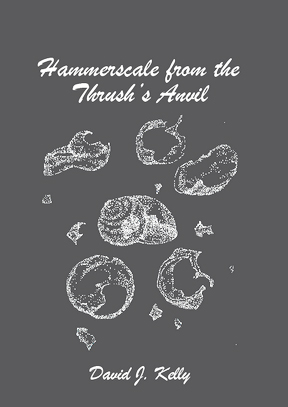Bob Lucky
Review of David J. Kelly's Hammerscale from the Thrush's Anvil. Alba Publishing, 2016.
David J.Kelly, Hammerscale from the Thrush's Anvil, Alba Publishing, Paperback, 50pp, November 2016, ISBN 9781910185520, €12 / £10 / $14, To order, email: info@albapublishing.com
The brevity of this review has nothing to do with the quality of the work – it's just that there are only four haibun in the collection, unless one counts the note at the very end of the book explaining that half the profit from sales will go to Pieta House, an Irish charity devoted to preventing suicide and self-harm. That prose block ends with a beautiful haiku. In fact most of the haiku in this collection are excellent.
The book is divided into five sections. The last section, "Release," is a free verse poem that attempts to both illustrate and explain the 'one-breath', nature of haiku. This is unnecessary as the haiku and senryu in this collection wonderfully demonstrate that. The senryu are pitch-perfect.
 fun up to a point learning curve (16) fun up to a point learning curve (16)
biting my tongue
and swallowing
my father's words (31)
revised prognosis
none of us dying
to know (34)
And many of the haiku are nicely suffused with a quiet humor.
catching our drift
the hairs at the end
of the bandicoot’s nose (13)
next to nothing
in the bright summer sky
day moon (19)
The haibun – "a combination of prose and haiku" (6) – are meant to serve as entry points to each section. The fact that Kelly feels compelled to gloss 'haibun' for the reader is telling. But what exactly does it say? Haibun is still a mystery to readers of haiku? Perhaps.
The four haibun in this collection are all of a philosophical bent. The first, with its fairy tale title "Once Upon a Time," asks the big ontological question: how did we get here? The following three haibun narrow the search down to a more personal level. In the next haibun, "Howth Head," the poet places himself in nature but also as an observer of nature, which has the effect of washing him clean. Here we're into a private soteriology of sorts. In "A Sense of Achievement," the haibun introducing the third section, and "Just Saying 'No'," the last haibun, the poet is reflecting on change, noting both who he has become and wondering what the younger version of himself might think about that. This is a bit of a trope in the memoir strand of haibun, but Kelly is restrained, giving us only as much as we need to know to see ourselves in the poet. (And if you study the haiku in this collection, you may well find the poet in you.)
Just saying “No” (38)
On the city streets, where streams of pedestrians pool and eddy, there are always people seeking your loose change; buskers, entertainers, chuggers, beggars. I’ve not yet tried counting how many I pass in any given day, but I’ve already convinced myself it’s not possible to give something to all of them. Surely everyone has some sort of selection process. Try as I might, I can’t come up with a consistent rule or a consistent amount; the weather, or children, or dogs (or rabbits), or bandages, may, or may not, make a difference. I can’t even be sure if they ought to. So, as each day passes, it gets easier and easier to decline the acts of philanthropy that are invited of me, whatever the circumstances. If anyone asks, I can claim compassion fatigue and dismiss the plausible alternative, that I have grown cold-hearted.
coffee cup in hand
simply waiting for the milk
of human kindness
|

